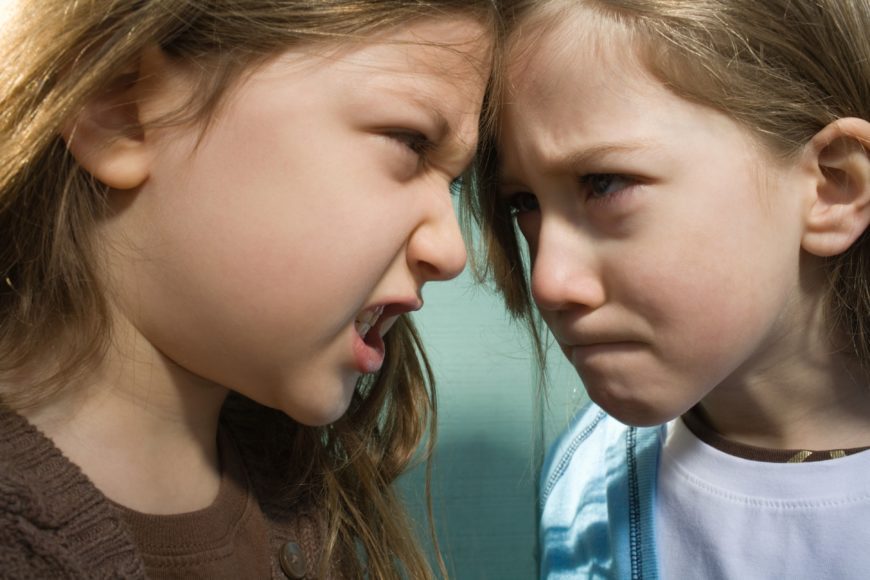A mother tells me, “To some extent, I enjoy my daughters’ quarrels during which they say terrible things to each other: ‘I have decided not to have a sister any more. I will tell my mom and she will return your desk to IKEA». The mother goes on, “I’m thinking of recording them and keeping these conversations for them to listen to, when they grow up and, inevitably, life will separate them.” Before adolescence, constant rivalries rarely develop between children belonging to the same space: school class, company with which they play daily or siblings living in the same house. It is good to keep in mind that sibling fights help children to get accustomed to putting forward their arguments and get tough as they struggle to subdue each other. In addition, they learn to defend themselves and, thus, demonstrate their worth. Also, through them, children are taught to practise their verbal skills, thus developing a healthy competition and a compromising mood.
There cannot always be a good relationship between siblings
- Although siblings happen to be born into the same family, from the same parents, it does not mean that they should or that they can always have a good relationship with each other.
- Siblings share a lot without having chosen it: home, toys, parents and other relatives and, most importantly, their love, attention and acceptance. Siblings are different people and it is normal for them to disagree on many occasions.
What does clinical and sociological research support?
- That all siblings quarrel sometimes
- That siblings who quarrel most often are those who have a slight age difference or are of the same gender
What are the reasons for the sibling quarrels?
- They have more to share and compare
- They have similar needs, rights and obligations
- There is a greater competition between them
- Each of them wants to have it his/her own way at that particular moment
- They only acknowledge their own view and their own wants
- They get angry when they do not acquire what they want
- They expect the other sibling to change and to give up
- They seek to attract attention
- They are tired, irritated or angry for other reasons
What happens to parents when their children quarrel?
- Children’s quarrels, especially when they are frequent and intense, cause a lot of problems for the parents
- They also tire them out or may even lead them to despair
- When they take place in a social milieu, they can put them in a particularly difficult position as well as cause them to feel embarrassed
- Most parents feel the need to intervene in order to do something to stop the fighting and to help the children improve their relationship
What can parents do during a fight?
- To show that they trust their children’s ability to come up with a solution which would be acceptable to both of them
- To give their children the opportunity to resolve their differences on their own
- To keep in mind that, if the parent always has the last word, then the children will never learn to resolve their differences on their own
- To avoid getting involved as soon as the “spirits” start to “sharpen”
When and how should parents intervene?
If the fight becomes violent or dangerous, they can intervene using 3 techniques:
- Truce (Break)
- Immediacy
- Restraint
Truce (Break)
When control of the situation is lost, there should be a “break” – the children must move away from each other and remain separated for a while. Next, the parents invite them to think of different ways to ask for what they want when they return to the place where the quarrel took place.
Immediacy
If they see an imminent danger (a child preparing to throw a stone at another), they act immediately, without having to explain.
Restraint
They can immobilize children by blocking their movements, without hitting them (otherwise, they prove to them that violence is a correct method of resolving conflicts).
It is important for parents to know that:
- their intervention should focus on finding out what has happened by listening to their children with calmness and coolness
- they must give their children the opportunity as well as equal time to express their opinion
- they must not blame either one or the other
- they need to try to understand and to help their children understand as well the reasons why their game or conversation turned into a quarrel
- whatever technique they have in mind to teach their children, it is good that it focuses on compromise. Compromise means concession. So, as a sign of goodwill and cooperation, parents ask their children to make a small concession, discussing and, if necessary, indicating, what benefit each child will have.
- they must always enforce the promised consequences which their own children have been called upon and chose themselves, having always as a basis the behavior that their children have exhibited
What should parents not do during a fight?
- not to try to teach their children new behaviors that they consider more appropriate and more effective because their children’s psycho-emotional state simply does not allow them to listen to their parents
- once the spirits have calmed down, it is good to tell their children what they have in mind and to teach them more appropriate behaviors which parents will encourage them and remind them to apply the next time they quarrel
How can parents help normalize relationships between their children?
Parents help normalize relationships between their children by:
- helping them understand each other. In other words, parents should assist their children understand how their sibling feels about the subject of the quarrel
- keeping always in mind that children, due to their age, are very “egocentric” creatures and have difficulty in putting themselves in their sibling’s shoes (they lack witempathy)
- showing respect for the child even if they do not agree with him/her
- helping their children claim what they want in an appropriate way
- showing their children more acceptable ways of expressing anger, frustration, jealousy, resentment and many other negative emotions so that they do not express them through quarrels
- explaining and emphasizing that the emotions themselves, no matter how negative, are not bad
- explaining with lots of patience and persistence and with lots of examples that the bad and unacceptable way may only be the manner which they choose to externalize their emotions, in other words, the behaviour which they exhibit
- analyzing and explaining, regardless of how many times it may be required, which behaviours they consider acceptable and which unacceptable
- not giving compound and vague instructions to their children, especially to the little ones, because they are not in a position to follow them. For example, instead of saying, “Play beautifully” it is wiser to say to them, “Please, play without shouting, share your toys, wait for your turn to come, and if you feel that you cannot agree, then call me to discuss the issue, I shall be in the seating room”.
- trying, as parents, to focus on the positive behaviours which their children exhibit and to award them as well, for this will reinforce their children’s self-esteem.
- not waiting for their children to argue in order to impose restraints on them. It is essential that parents express all the positive emotions that they experience when they see their children playing in a spirit of cooperation and mutual understanding.
- not ignoring the good behaviors which their children exhibit because, by doing so, they promulgate their disappearance. It is worth mentioning that many clinical and social studies support the fact that children’s behaviours, which parents pay attention to, are the ones that tend to occur more often. On the contrary, those which the parents ignore or do not notice, gradually decrease.
- being consistent with the consequences they determine. Deprivation must be a promise, not a threat. That is, deprivation must always be applied because it helps both parents and their children to keep/meet the limits they set. In addition, it helps their children develop self-control.
- acknowledging the fact that, as their children get older, they slowly understand that they have a choice between good and bad behavior. If they behave badly, then as parents, as they have agreed with and explained to their children, they need to put things in order because this will help their children mature and develop critical and analytical thinking.
- praising or rebuking a particular behaviour and not the child himself/herself, otherwise the child will feel rejected as a person because of the bad behavior he / she has shown.



